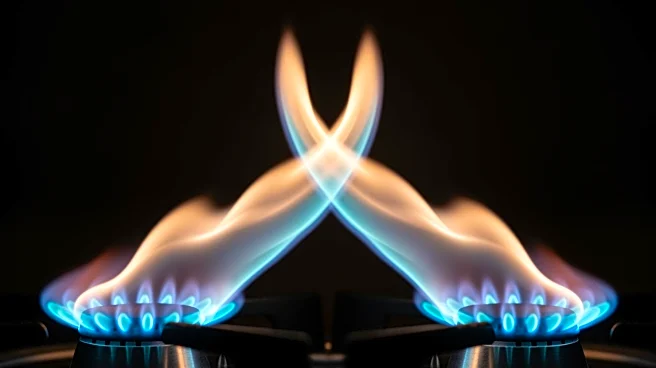What's Happening?
Greece has signed a significant agreement with Ukraine to facilitate the delivery of U.S. liquefied natural gas (LNG) to Ukraine, marking Greece as the first EU member to support the U.S. plan to replace Russian gas with American LNG. The deal, signed on
November 16, involves shipping LNG through Greece to Ukraine via the 'Vertical Corridor,' with deliveries starting in January 2026. This initiative aims to bolster energy security in Ukraine, especially as the country faces a challenging winter due to Russian attacks on its infrastructure. Greek Prime Minister Kyriakos Mitsotakis emphasized Greece's unwavering support for Ukraine, citing the importance of sovereignty and international law. Ukrainian President Volodymyr Zelenskyy expressed gratitude for the support, highlighting the critical need for reliable energy supplies amidst ongoing Russian aggression.
Why It's Important?
The agreement between Greece and Ukraine is pivotal in reshaping energy dynamics in Europe, reducing dependency on Russian gas, and enhancing regional energy security. This move aligns with broader Western efforts to isolate Russia economically and politically due to its actions in Ukraine. The deal also underscores Greece's strategic role in European energy supply chains and its commitment to supporting Ukraine's sovereignty. For Ukraine, securing alternative energy sources is crucial for maintaining stability and meeting the needs of its population during the winter months. The agreement may provoke further geopolitical tensions, as evidenced by Russia's strong reaction, accusing Greece of hostile actions.
What's Next?
The implementation of the LNG deliveries will commence in early 2026, with Greece temporarily supplying natural gas to Ukraine until then. The agreement may lead to increased diplomatic and economic pressure on Russia, potentially resulting in retaliatory measures. Greece and Ukraine plan to strengthen military cooperation, focusing on maritime security and cybersecurity. The European Union is expected to continue supporting Greece and Ukraine, reinforcing its defense readiness against Russian threats. Meanwhile, Turkey's decision to continue purchasing Russian gas despite U.S. calls for cessation may complicate regional dynamics.
Beyond the Headlines
The agreement highlights the complex interplay between energy security and geopolitical alliances. Greece's support for Ukraine reflects broader European solidarity against Russian aggression, while also addressing its own historical grievances related to territorial sovereignty. The deal may influence future EU energy policies, encouraging diversification away from Russian energy sources. Additionally, the focus on cybersecurity and hybrid threats indicates a growing recognition of non-traditional security challenges in the region.
















